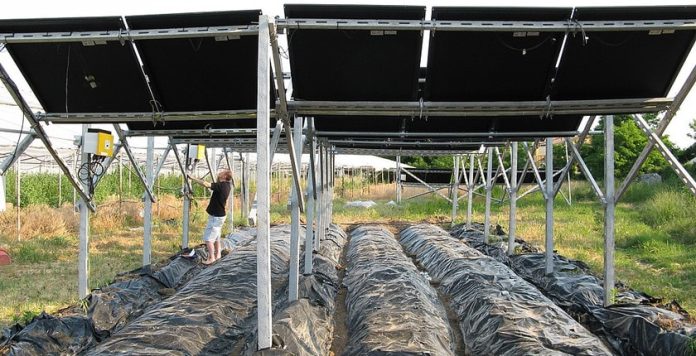The mayor of a village near Veliko Tarnovo in Bulgaria is refusing to give clearance for a photovoltaic project on pastures without a comprehensive public discussion. Conversely, well-known developer Eurohold introduced a wide set of environmental protection measures at the site of its planned 100 MW facility, which would be built on lowest-grade land.
Agricultural land in Bulgaria is more and more popular for investments in solar power, causing controversies and resistance by the local population. Throughout the Balkans and beyond, developers are advertising their projects as agrivoltaics, also known as agrisolar.
The concept implies agricultural production at the site of a photovoltaic plant. The panels typically need to be placed high above the ground. However, it often comes down only to letting cattle graze at the location of ground-mounted systems, which lowers maintenance costs anyway. Villagers in Novo Selo in the Veliko Tarnovo area in north Bulgaria aren’t buying it.
The municipal council requires a formal opinion from the head of the Novo Selo village to be able to vote on the project proposal
Radomir Solar Energy, part of Tera Sol Energy, intends to occupy 130 hectares for a solar power plant. Most of it are pastures. The company promised locals that it would allow them to keep using the land for the same purpose. Furthermore, it vowed to launch a program for help to vulnerable population.
The local authority would be entitled to 3% of turnover or, as the firm estimated, up to EUR 510,000 per year. A large portion would be directed to Novo Selo, it added.Village chief Hristo Hristov said he supports photovoltaics, but expressed doubt that agricultural land is the best option for such investments. His opinion is necessary for the municipal council in Veliko Tarnovo to be able to discuss the proposal. But Hristov stressed that he wouldn’t isssue one without a public discussion a gathering of the inhabitants. It won’t happen before winter, he pointed out.
Solar power projects springing up, but so are protests
In nearby Ledenik, there were protests and meetings, but the city authorities agreed to change the purpose of 26.7 hectares of municipal land to enable the construction of a solar power plant. In Vishovgrad in Pavlikeni in the same province, villagers are opposed to a similar project.
At the same time, the city council in Kardzhali in the south of the country is about to vote on a project for a photovoltaic plant in the village of Ostrovica on 31.2 hectares of municipal land. News reports indicated that it includes protected areas that fall under Natura 2000.
A proposal for a green hydrogen facility and solar park is among the potential investments on public land
Estimated annual output is 26 GWh. The authorities in Kardzhali are entitled to a long-term contract for the purchase of electricity at a lower price.
Another investor submitted a request to the authorities in Vratsa in northwest Bulgaria to approve a green hydrogen project. The electrolyzer on municipal land in the village of Kostelevo would be powered by a solar park and produce 730 tons per year.
Far-right opposition party Revival earlier demanded a moratorium on repurposing agricultural land owned by the state and municipalities until the matter is regulated by law.
Company delayed solar park investment to prepare measures to protect, boost biodiversity
Conversely, the Belozem Solar Park 2 project of 100 MW will be built on 127 hectares of the lowest category, Elektrohold said. Moreover, it pointed out that its parent company Eurohold and 360 Energy earlier delayed the project to plan all-encompassing environmental protection measures. The scope was reduced, mostly to preserve a ground squirrel colony.
The location is on municipal land on the territory of Maglizh near Stara Zagora, in the central part of the country. Construction is expected to begin toward the end of the year and be completed by mid-2024. The investment is estimated at EUR 100 million, the firm added.
The same equal partnership recently commissioned Verila, Bulgaria’s biggest solar power plant. The project firm in that endeavor is called Belozem Solar Park 3.
While villagers, local authorities and investors are arguing about the use of agricultural land for solar power, the framework for prosumers and energy communities remains incomplete
All permits and environmental clearances have been obtained for the new investment, Elektrohold said. Besides conservation, the firms expressed the ambition to increase biodiversity.
Within the program, among other measures, they said they would place beehives at the location and mark power lines to make them more visible to birds, so that they avoid collision. If it turns out there is enough water, the companies vowed to make a small pond or several of them. Needless to say, sheep and other cattle are envisaged to roam between the arrays.
While disputes are emerging over the use of agricultural land for solar power plants, it is worth mentioning that households, local authorities and activists in Bulgaria are complaining of an incomplete legal framework both for the installation of rooftop photovoltaics and other systems for own use and the establishment of energy communities.






